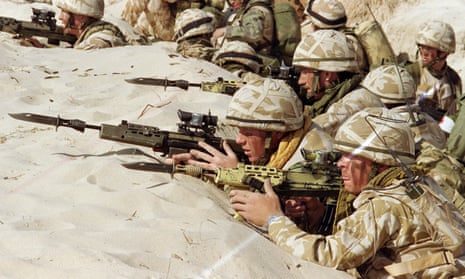The Royal British Legion is calling on the government to do more to help veterans suffering from Gulf war syndrome.
Up to 33,000 former soldiers could be living with illnesses linked to serving in the Gulf, where operations began 25 years ago, and it is not known how to effectively treat them, according to the charity.
Acute and chronic fatigue, muscle pain, cognitive problems, rashes and diarrhoea are among the symptoms, and the charity is urging the government to conduct more research into the issue.
Marie-Louise Sharp, of the Royal British Legion, which supports veterans, said: “We know the health of ill Gulf war veterans continues to be an important area for the government, which is why the Legion is calling for investment into research so we can understand how to improve the lives of those affected.
“In addition, we ask for formal communication channels to be established to convey the results of US research developments to Gulf war veterans living here in the UK.”
From 1991, 53,462 members of the British armed forces were deployed to the Gulf as part of Operation Desert Storm, the US-led campaign against the Iraqi invasion of Kuwait. Active combat operations began on 17 January 1991.
The Royal British Legion notes that research in the US, UK, Australia and Canada has found that veterans of the Gulf war report symptoms associated with Gulf war illnesses at about two to three times the rate of other veterans.
It found they are twice as likely to report post-traumatic stress disorder, have a poorer quality of life, and their symptoms tend to be experienced at a greater intensity than those who served in other comparable conflicts.
The Ministry of Defence said it has funded extensive research into Gulf war illness. It also continues to monitor developments in the US and said it would give consideration to any new research proposals.
An MoD spokesman said: “We are indebted to all those who served our country in the 1990-1991 Gulf conflict. In recognition of this, financial support is available to veterans and dependants, where an illness or death is due to service, through the war pensions scheme and armed forces occupational pensions schemes.
“We are clear that veterans should receive fair treatment following service and we are absolutely committed to supporting them and the wider armed forces community.”



